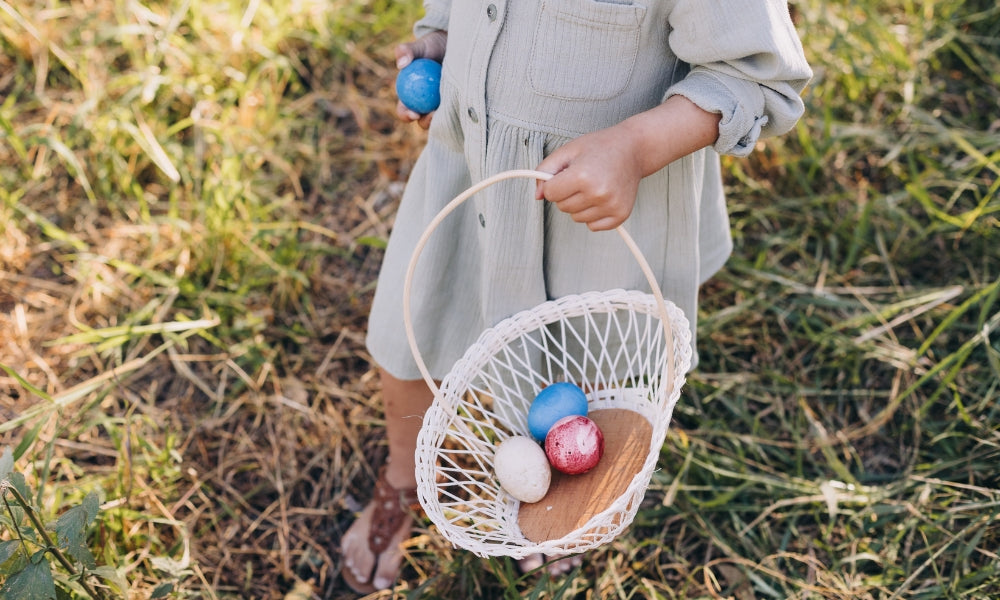
9 ways to apply your eco-ethos to Easter celebrations
Easter is a time for family gatherings, egg hunts, and indulging in chocolate treats, but it's also an opportunity to rethink our environmental impact. Many of the traditions we associate with Easter—such as plastic eggs, foil wrappers, and throwaway decorations—can contribute to unnecessary waste. But with a little craftiness and some eco-friendly choices, we can enjoy a more sustainable and creative holiday.
1. Eco-friendly easter eggs
Instead of plastic eggs, opt for reusable or biodegradable alternatives. If you need fake eggs make sure they’re durable and can be reused year after year. Look for ones made from wood, fabric such as felt, or even try using painted river stones or paper mâché. Often the joy is in creating and decorating eggs and they may not stand the test of time. So, go old school and use real eggs. You can paint and decorate the shells of real eggs and, if you’re careful, they can still be eaten when the festivities are over—and the shells can be composted.
2. Minimise the packaging
While chocolate eggs wrapped in foil are a staple of Easter, the aluminum foil will most likely end up in landfill (note that in some regions of NZ you can ball it up and add it to your kerbside recycling). Look for chocolates that use minimal or sustainable packaging without extra plastic wrappers. You might be able to find eggs in paper wrappers or boxes made from recycled materials. Or, if you have a chocolaterie (choc boutique) nearby, grab some unwrapped chocolate eggs and make your own paper or cloth wraps or custom cardboard gift box or reusable basket.
3. Use compostable bags for leftovers
After indulging in a mountain of Easter chocolates, it's common to have leftover treats. Rather than using plastic wrap or disposable containers, use Ecopack Compostable Resealable Bags. These eco-friendly bags are perfect for storing leftover chocolate and keeping it fresh. They come in snack, sandwich and storage size, and will break down naturally once disposed of, leaving no harmful impact on the environment.
4. Decorate with nature
Many Easter decorations come in the form of plastic or synthetic materials, which are not biodegradable. Instead, consider using natural elements like flowers, branches, or recycled paper and ribbons for decorations. You can also repurpose old Easter cards to make garlands or other creative decor.
5. Sustainable Easter baskets
Instead of purchasing a new basket each year, repurpose or upcycle baskets, boxes, little drawstring bags, or containers you already have. If you need to purchase a basket, look for one made from natural materials like bamboo, wicker, or jute, which are much more eco-friendly than plastic alternatives. Or have a go at weaving a basket from flax as one of your Easter craft activities!
6. Gift eco-friendly products
If you’re giving Easter gifts, consider opting for items that are both thoughtful and sustainable. Organic chocolates, reusable water bottles, reusable bags or handmade crafts can make great eco-conscious alternatives to plastic toys and trinkets. Or, because Easter coincides with a change in seasons, consider giving a fresh set of pyjamas which you know will be well-used.
7. Make mindful food choices
Easter meals can create a significant amount of food waste, but this can be minimised by planning meals carefully. Opt for local and seasonal produce and throw any food scraps in your benchtop caddy to be composted. Leftover food can also be stored in eco-friendly containers, like glass jars or resealable compostable bags, to reduce single-use plastic waste.
8. Opt for quality over quantity
Instead of grabbing loads of cheap chocolate and single-use plastic, put a little thought into your gifts and decorations. Buy New Zealand made or Fairtrade chocolate and head to your local farmers market for other treats and ingredients.
9. Start a new Easter tradition
Have you ever tried baking your own hot cross buns? Or is there an Easter or bunny themed activity or movie that the whole family might like? Or you can take inspo from other countries and cultures—fly kites like they do in Bermuda, or decorate hard boiled eggs like they do in Europe, or have a water fight like they do in Poland!
----------
By making small adjustments to your Easter traditions, you can have a fun, festive celebration while reducing your environmental impact. From choosing sustainable packaging to opting for reusable items, every eco-conscious choice counts—aim for progress each year rather than perfection.
Happy Easter!

